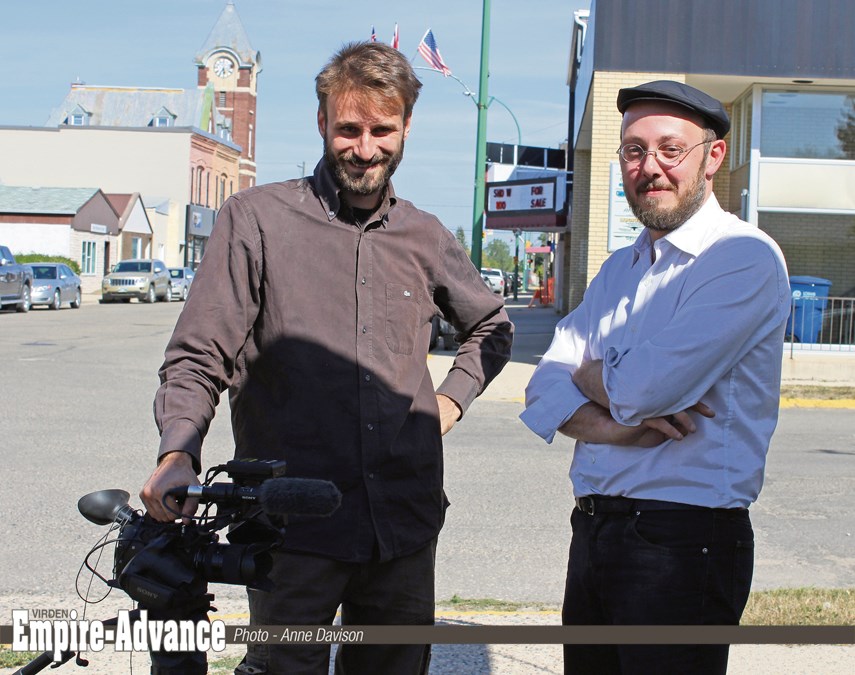At this moment, the European Union is deciding about the permission to use glyphosate...; Manuele Bunaccorsi
Italian journalists were shooting footage at Nelson Street and Eighth Ave. on Sept. 6, for a documentary they are putting together about wheat production and marketing in Canada.
Journalist with Italy’s national television Manuele Bunaccorsi, in an interview, explained the point of their documentary. “We want to do a comparison between the Italian farm industry and Canadian farming. Italy is the main importer of Canadian wheat, especially durum for pasta.”
However, there was a deeper purpose – concerning the use of chemicals, particularly the commonly used product, glyphosate known as Round Up. This chemical that is used to kill weeds is also sprayed on ripening wheat fields as a pre-harvest desiccant.
Bunaccorsi spoke English well, but with an accent. He stated, “We import one million tonnes of Durham, so we are very interested; because in Italy we are talking about glyphosate problem, that you use a lot of glyphosate in pre-harvest. In Italy, someone says it is [linked] to human cancer.”
An organization in Italy made the connection with an Italian farmer in the Virden area, Giovanni (Johnny) Colangelo. From there, a series of stops were arranged in Canada for the film crew. Chapman Farms was on the list and the filmmakers spent time with both Perry and Rob Chapman, filming as combines harvested the fields.
While Italy imports Canadian durum, Perry Chapman explained that no durum is grown in this area. Manitoba is known for red spring wheat. “For durham wheat, it probably would have been better in southern Saskatchewan, but wheat production is similar no matter what class of wheat you are doing.
“I guess it was wheat production in general they wanted to know about. They seemed to be interested in the procedures, what fertilizers, and herbicides we were using,” he said. “They wanted to know whether we thought using a desiccant was a health issue.”
Pre-harvest desiccation is a widely used process in the breadbasket of the Canadian prairies, evidenced by the sprayer tracks in ripening fields. Of the possible risks, Chapman said, “There’s nothing that I’m aware of.” He explained that pre-harvest spraying helps farmers get the crop off the field more quickly and in dry condition. He added, “You get control of the weeds.”
Said Bunaccorsi, “At this moment, the European Union is deciding about the permission to use glyphosate, within the European Union.”
It is not even used as a weed killer there. He said, “In Italy, we can’t use it for pre-harvest. It’s not allowed.”
Colangelo, who farms south of Virden and returns to Italy every winter, explained that Italians typically eat wheat products including breads, twice per day. It’s a big part of their diet, and the majority of it comes from Canada. He said, “Right now, there’s a big concern about what people eat.”
With the heavy reliance of chemicals in Canadian wheat production, there is also a growing concern about food-related health issues, and he said it is being researched.
“We are seeing, in Italy, a spike of Celiac in people, allergic people, all sorts of disease that we hadn’t had before. And I’m talking 10 – 20 years ago,” he said.
Celiac condition and other, sometimes related allergies, takes a toll. “If you have one of those diseases, the cost of eating - it goes up...because they cannot eat any flour, they cannot eat, probably milk products, and stuff like that. They have to go on a very special diet,” Colangelo explained. “But it is not only an economical aspect; it is a health aspect too.”
The documentary is part of informing the Italian public about the wheat they consume.
The Italian documentary crew also visited Redfern Farm Services and a nearby grain elevator.
Bunaccorsi and Palermo were also interested in how Canadian wheat is marketed, including the now closed Canadian Wheat Board; and in Regina an interview regarding the CWB was planned with a Farmers Union representative.
Chapman said, “They quizzed me on that, as far as whether we are better off without it.” Chapman went on to say, “There were a lot of things the Wheat Board did for us, that the larger grain companies aren’t doing. It’s like anything, as a farmer, you’re forced to adapt and carry on.”
Grain prices for Canadian farmers rose the year the Wheat Board was taken down.
Chapman said, “It just happened to be the year that there was a drought and grain prices worldwide went up. It wasn’t a factor of the Wheat Board disappearing.”
To complete the story of Canadian wheat production, the Italian documentary makers planned to end their Canadian tour at the grain loading terminals in Vancouver Harbour, later in the week.
Italian cameraman Paolo Palermo and journalist Manuele Bunaccorsi are on the streets of Virden to shoot footage for a documentary that will air on national television in Italy.




